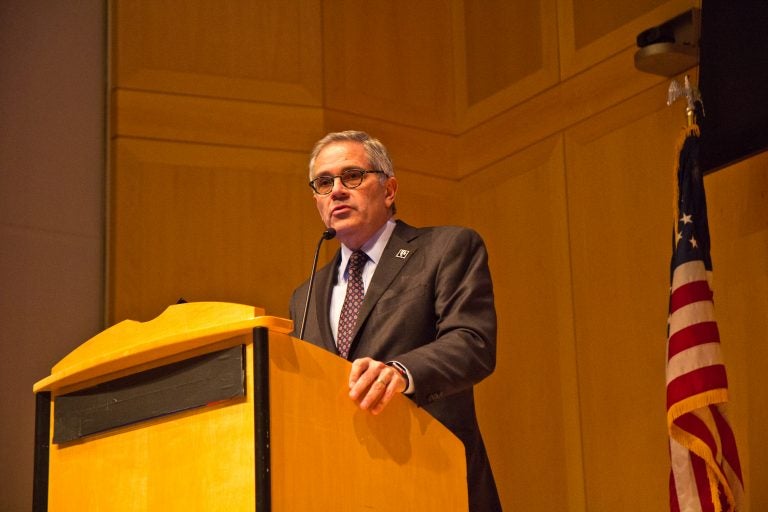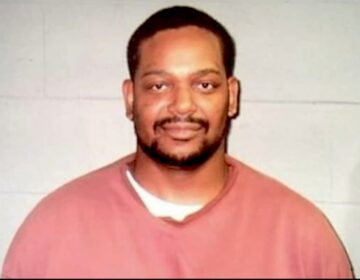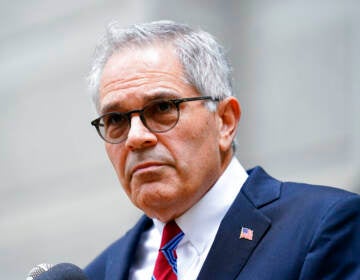Philly DA says he’s striving for justice not harshest sentence in homicide cases
Some family of murder victims have called this approach unjust.
Listen 1:13
Larry Krasner is District Attorney of Philadelphia. (Kimberly Paynter/WHYY)
A shift is underway in how murder cases are prosecuted in the Philadelphia district attorney’s office under maverick Larry Krasner.
For generations, a defendant charged with a killing in the city could expect prosecutors to bring the hammer down hard, asking courts that suspects be held on charges of first- or second-degree murder. In Pennsylvania, that would make a defendant ineligible for bail. And conviction would yield an automatic life sentence.
Krasner is trying to reinvent the playbook.
“There are five levels of homicide. Some among them are murder. My job is not to charge people with things they did not do. Unfortunately, my predecessors liked to do that,” Krasner told WHYY recently.
In at least a half-dozen cases since Krasner assumed office in January, murder charges have been reduced to third-degree murder or involuntary manslaughter, according to an analysis by the Philadelphia Inquirer.
In those cases, defendants are permitted to post bail for release ahead of trial, and the maximum possible prison term is significantly reduced.
Some family of murder victims have called this approach is unjust, saying perpetrators should be punished to the fullest extent of the law.
This year, some relatives of victims said, Philadelphia prosecutors struck deals for reduced charges or decided to refile less severe counts against a suspect without notifying the family.
Jennifer Storm, Pennsylvania’s victim advocate, said she’s gotten calls from family members who were “very upset” after learning about a case’s change in direction under Krasner.
“Families have a right by law to be notified of these decisions,” Storm said. “If we’re talking about lessening charges and accepting plea negotiations, or entering the plea negotiations, those victims — the families — have the right to confer with the prosecutor.”
There have also been instances when misinformation spread fast, Storm said.
For example, she said media reports in a few cases claimed Krasner’s office did alert a murder victim’s family about a case’s change in status. After investigating, she’d learn that a distant family member spoke out publicly, whereas the victim’s next of kin was contacted by prosecutors but chose not to respond to media requests.
“I’ve never known him as someone who doesn’t care about victims,” she said of Krasner. “But he comes to the table with a very aggressive agenda. He doesn’t want to see people incarcerated for long periods of time.”
When asked about the criticism from grieving family members, Krasner struck a sympathetic note. Yet he also suggested that his approach was more virtuous than that of past district attorneys in Philadelphia in that he wants to go after lesser charges up front.
“I respect their pain,” he said of the relatives. “We’re telling them the truth, and we’re telling them the truth from the beginning, rather than lying to them and blaming the court system later.”
Not everyone is witnessing a revolution in the courtroom.
David Nenner, a Philadelphia criminal defense lawyer who has handled homicide cases for three decades, said reducing charges in six out of 171 cases is not statistically significant. In cases he has defended against Krasner’s line prosecutors, he has noticed little difference.
“Every new chief has their own agenda. And with Krasner, I see a little bit of difference,” Nenner said. “But not much. I will say this, in every homicide case I’ve fought for this year, I’ve still had to put up a real fight.”
Krasner’s prosecutors have had a total of 171 homicide cases referred to the office this year, according to a spokesman. Out of those, prosecutors declined to pursue charges in just 11 of them.
WHYY is your source for fact-based, in-depth journalism and information. As a nonprofit organization, we rely on financial support from readers like you. Please give today.




